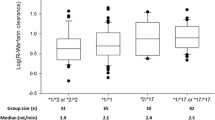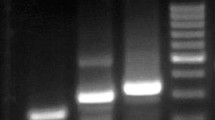Abstract
Background
Warfarin is the most commonly evaluated drug in pharmacogenetic-guided dosing studies. However, gaps remain regarding the influence of the genetic polymorphisms of CYP2C9, VKORC1, and CYP4F2 on specific pharmacodynamic parameters like the warfarin sensitivity index (WSI), prothrombin time international normalized ratio (PT-INR), and log-INR variability.
Methods
A cross-sectional study was conducted in non-smoking adults receiving warfarin for at least 6 months. Their demographics, diagnoses, warfarin dosing regimen, concomitant drugs, PT-INR, and bleeding episodes were obtained. CYP2C9 (rs1057910-*3 and rs1799853-*2 alleles), CYP4F2 (rs2108622), and VKORC1 (rs9923231) polymorphisms were assessed using real-time polymerase chain reaction. Three genotype groups (I-III) were defined based on the combined genetic polymorphisms of CYP2C9 and VKORC1 from the FDA’s recommendations. Key outcome measures included anticoagulation control, time spent in therapeutic range, stable warfarin dose, WSI, log-INR variability, and Warfarin Composite Measure (WCM).
Results
The study recruited 236 patients; 75 (31.8%) carried a functional CYP2C9 variant allele, and, 143 (60.6%) had at least one T allele in CYP4F2 and 133 (56.4%) had at least one T allele in VKORC1. Groups’ II and III CYP2C9 and VKORC1 genotypes were observed with reduced stable warfarin dose, increased WSI, higher log-INR variability, and increased bleeding risk. The presence of *2 or *3 allele in CYP2C9 was observed with reduced stable warfarin doses akin to the presence of T alleles in VKORC1; however, the doses increased with T alleles in CYP4F2.
Conclusion
The evaluated genetic polymorphisms significantly influenced all the pharmacodynamic parameters of warfarin. Evaluating CYP2C9, VKORC1, and CYP4F2 genetic polymorphisms prior to warfarin initiation is likely to optimize therapeutic response.
Graphic abstract





Similar content being viewed by others
References
Bourgeois S, Jorgensen A, Zhang EJ, Hanson A, Gillman MS, Bumpstead S, et al. A multi-factorial analysis of response to warfarin in a UK prospective cohort. Genome Med. 2016;8(1):2.
Al-Eitan LN, Almasri AY, Khasawneh RH. Effects of CYP2C9 and VKORC1 polymorphisms on warfarin sensitivity and responsiveness during the stabilization phase of therapy. Saudi Pharm J. 2019;27(4):484–90.
Zhou L, Ding Y, Gao Y, Yang B, Bao J, Ma J. Genetic influence on bleeding and over-anticoagulation risk in patients undergoing warfarin treatment after heart valve replacements. Expert Opin Drug Metab Toxicol. 2020;16(1):1–9.
Sridharan K, Modi T, Bendkhale S, Kulkarni D, Gogtay NJ, Thatte UM. Association of genetic polymorphisms of CYP2C9 and vkorc1 with bleeding following warfarin: a case-control study. Curr Clin Pharmacol. 2016;11(1):62–8.
Sun X, Yu WY, Ma WL, Huang LH, Yang GP. Impact of the CYP4F2 gene polymorphisms on the warfarin maintenance dose: A systematic review and meta-analysis. Biomed Rep. 2016;4(4):498–506.
Johnson JA, Caudle KE, Gong L, Whirl-Carrillo M, Stein CM, Scott SA, et al. Clinical pharmacogenetics implementation consortium (CPIC) guideline for pharmacogenetics-guided warfarin dosing: 2017 update. Clin Pharmacol Ther. 2017;102(3):397–404.
Sridharan K, Sivaramakrishnan G. A network meta-analysis of CYP2C9, CYP2C9 with VKORC1 and CYP2C9 with VKORC1 and CYP4F2 genotype-based warfarin dosing strategies compared to traditional. J Clin Pharm Ther. 2020. https://doi.org/10.1111/jcpt.13334.
Ye C, Jin H, Zhang R, Sun Y, Wang Z, Sun W, et al. Variability of warfarin dose response associated with CYP2C9 and VKORC1 gene polymorphisms in Chinese patients. J Int Med Res. 2014;42(1):67–76.
Sridharan K, Al Banna R, Qader AM, Husain A. Evaluation of inter-patient variability in the pharmacodynamic indices of warfarin. Expert Rev Cardiovasc Ther. 2020;18(11):835–40.
Lane DA, Lip GY. Use of the CHA2 DS2-VASc and HAS-BLED scores to aid decision making for thromboprophylaxis in nonvalvular atrial fibrillation. Circulation. 2012;126(7):860–5.
Lip GY. Atrial fibrillation and stroke prevention: brief observations on the last decade. Expert Rev Cardiovasc Ther. 2014;12(4):403–6.
Dean L. Flurbiprofen Therapy and CYP2C9 Genotype. In: Pratt VM, Scott SA, Pirmohamed M, et al., editors. Medical Genetics Summaries [Internet]. Bethesda (MD): National Center for Biotechnology Information (US); 2019. https://www.ncbi.nlm.nih.gov/books/NBK537365/. Accessed 30 Mar 2021.
Esteve-Pastor MA, Rivera-Caravaca JM, Roldán-Rabadán I, Roldán V, Muñiz J, et al. Quality of oral anticoagulation with vitamin K antagonists in ‘real-world’ patients with atrial fibrillation: a report from the prospective multicentre FANTASIIA registry. EP Eur. 2018;20:1435–41.
Sridharan K, Banny RA, Husain A. Evaluation of stable doses of warfarin in a patient cohort. Drug Res (Stuttg). 2020;70(12):570–5.
Fihn SD, Gadisseur AA, Pasterkamp E, van der Meer FJ, Breukink-Engbers WG, Geven-Boere LM, et al. Comparison of control and stability of oral anticoagulant therapy using acenocoumarol versus phenprocoumon. Thromb Haemost. 2003;90(2):260–6.
Razouki Z, Burgess JF Jr, Ozonoff A, Zhao S, Berlowitz D, Rose AJ. Improving anticoagulation measurement novel warfarin composite measure. Circ Cardiovasc Qual Outcomes. 2015;8(6):600–7.
Sridharan K, Al Banny R, Qader AM, Husain A, Qader KM. Health-related quality of life in patients receiving oral anti-coagulants: a cross-sectional study. Expert Rev Cardiovasc Ther. 2020;18(5):309–14.
Gaikwad T, Ghosh K, Avery P, Kamali F, Shetty S. Warfarin dose model for the prediction of stable maintenance dose in indian patients. Clin Appl Thromb Hemost. 2018;24(2):353–9.
Shi C, Yan W, Wang G, Wang F, Li Q, Lin N. Pharmacogenetics-based versus conventional dosing of warfarin: a meta-analysis of randomized controlled trials. PLoS ONE. 2015;10(12):e0144511.
Genotype-guided versus standard warfarin dosing. https://clinicaltrials.gov/ct2/show/NCT03479684?term=warfarin+randomized+trial&draw=2&rank=5. Accessed 20 Feb 2021.
A trial of genotype-based warfarin initiation in patients with mechanical prosthetic heart valve (SYSU-WARFA). https://clinicaltrials.gov/ct2/show/NCT01633957?term=warfarin+randomized+trial&draw=3&rank=68. Accessed 20 Feb 2021.
Individualized Administration of Warfarin by Polymorphisms of VKORC1 and CYP2C9 Genes. https://clinicaltrials.gov/ct2/show/NCT03797534?term=warfarin+randomized+trial&draw=4&rank=101 Accessed 20 Feb 2021.
Shah RR. Genotype-guided warfarin therapy: Still of only questionable value two decades on. J Clin Pharm Ther. 2020;45(3):547–60.
Zhang JE, Klein K, Jorgensen AL, Francis B, Alfirevic A, Bourgeois S, et al. Effect of genetic variability in the CYP4F2, CYP4F11, and CYP4F12 genes on liver mRNA levels and warfarin response. Front Pharmacol. 2017;8:323.
Acknowledgements
We thank the AGU RCSI-MUB steering committee for approving funding for this research proposal. We are grateful to all the staff nurses who assisted us during the study conduct. We also thank Prof. Reginald Sequeira for his initial liaison with the RCSI-MUB collaborators.
Funding
The study was funded by AGU RCSI-MUB Joint research grant with the Grant number 2019-2.
Author information
Authors and Affiliations
Contributions
Conceived the idea and obtained funding: KS; data acquisition and analysis: KS, RA, AH; genotyping: ZM, MS; data interpretation: KS, MS, GJ, SO; drafting the work: KS; critical revision and final approval of the version: KS, RA, ZM, AH, MS, GJ, SO; accountability: KS.
Corresponding author
Ethics declarations
Conflict of interest
None.
Additional information
Publisher's Note
Springer Nature remains neutral with regard to jurisdictional claims in published maps and institutional affiliations.
Supplementary Information
Below is the link to the electronic supplementary material.
Rights and permissions
About this article
Cite this article
Sridharan, K., Al Banna, R., Malalla, Z. et al. Influence of CYP2C9, VKORC1, and CYP4F2 polymorphisms on the pharmacodynamic parameters of warfarin: a cross-sectional study. Pharmacol. Rep 73, 1405–1417 (2021). https://doi.org/10.1007/s43440-021-00256-w
Received:
Revised:
Accepted:
Published:
Issue Date:
DOI: https://doi.org/10.1007/s43440-021-00256-w




